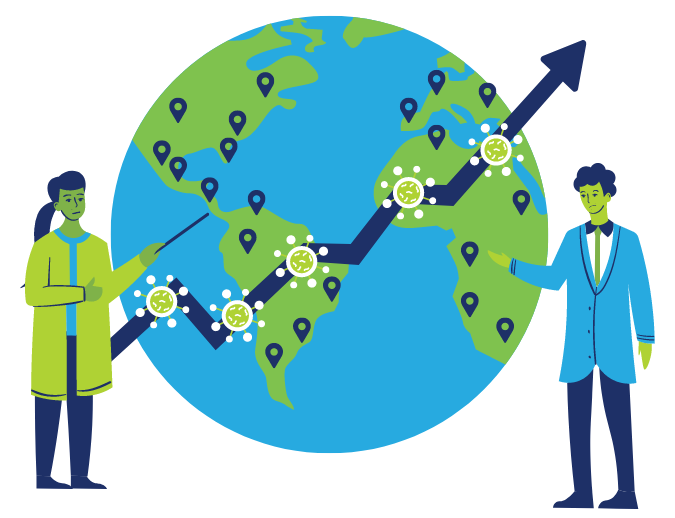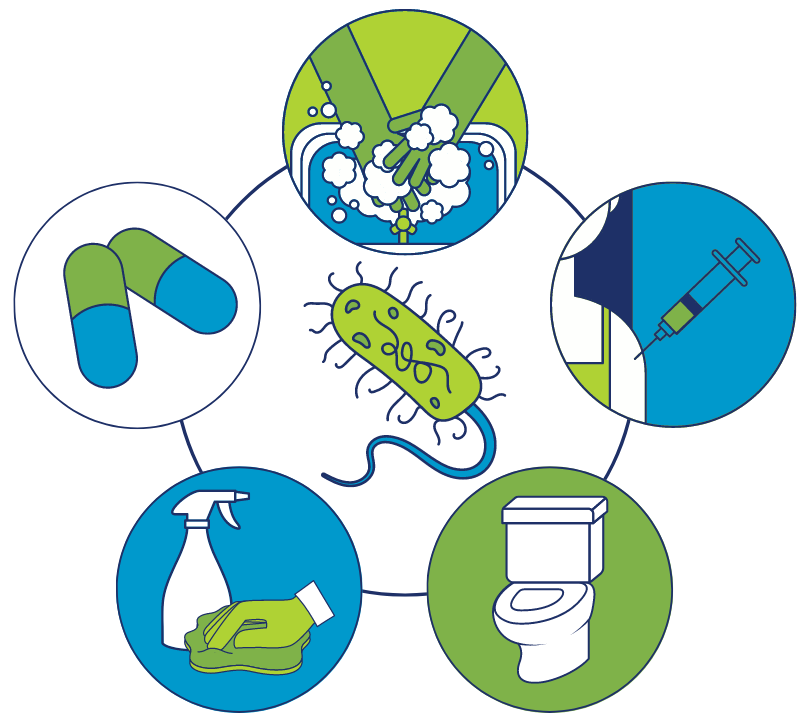
Dr. Henry Skinner thought he had a winning new antibiotic – perhaps even more than one – when he was CEO of a small biotech company called SelectX Pharmaceuticals. But like so many other companies working to develop new antimicrobial drugs, it went bust.
Skinner learned a fair bit from that experience. Many people working in antibiotics become “gun-shy,” he says, or simply get burned out. But he’s taken those hard lessons and is using them as CEO of the AMR Action Fund. AMR stands for antimicrobial resistance – the inevitable ability of viruses, bacteria, fungi, and parasites to acquire resistance to antibiotics, antivirals, antifungals, and antiparasitic drugs. AMR Action Fund has one billion US dollars to invest in labs willing to take the gamble and develop new antibiotics.
The organization has also collaborated with the BBC on a documentary, “Race Against Resistance,” to tell the story of antimicrobial resistance and its effects on people.
Listen as Dr. Skinner chats with One World, One Health host Maggie Fox about lessons learned and the value of telling the story of antimicrobial resistance.
Maggie Fox 00:01
Hello and welcome to One World, One Health with the latest ideas to improve the health of our planet and its people. I’m Maggie Fox. Planet Earth faces many challenges—pollution, climate change, and new and reemerging infectious diseases—and they’re all linked. This podcast is brought to you by the One Health Trust with bite-sized insights into ways to help.
Henry Skinner has spent decades trying to help bring new antibiotics to the world. A former CEO of a small biotech company himself, Skinner is now the CEO of the AMR Action Fund. AMR stands for antimicrobial resistance—when germs resist the drugs used to fight them. The AMR Action Fund invests in companies that are working to develop new antibiotics and other antimicrobials.
They’ve also worked with the BBC on a documentary about the problems that highlights the very real-life altering effects of drug-resistant superbugs. In this episode, we’re chatting about the documentary and the problems it’s looking at. Henry, thanks so much for joining us.
Henry Skinner 01:07
Thanks so much, Maggie.
Maggie Fox 01:09
Can you first briefly outline this problem of antimicrobial resistance?
Henry Skinner 01:14
The issue was called antimicrobial resistance or AMR for short. And we need to go back about a 100 years to really understand this, maybe even before. But roughly a 100 years ago, in the 1920s, Fleming discovered penicillin, which was the first true antibiotic that was discovered, and then we learned how to make it and it really transformed healthcare starting in the 40s.
In fact, during World War 2, there was a Manhattan like project—top secret with enormous resources to manufacture this incredibly important drug to save the lives of hundreds of 1000s of soldiers as they were wounded in battle and developed infections. And through that initiative, we entered the antibiotic era, really which transformed medicine.
So, prior to that, millions of people died a year from infections, simple infections, and infection they’d might get working in their garden or just in normal course of life, but we had no ability to treat these infections. And that killed actually, they were the leading cause of death prior to antibiotics around the world and multiple leading causes. But since its introduction in the 40s, we have used and abused antibiotics and bacteria over time develop resistance to antibiotics.
So, bacteria that was sensitive that we could treat with penicillin in the 1940s and the 1950s and 60s, as we used penicillin, these organisms became resistant. So, penicillin didn’t kill them anymore. So, then we developed new antibiotics— —— , cephalosporins, aminoglycosides, and other things. And we had a heyday in the 50s and 60s leading into the 70s of numerous new antibiotics —— that would continue to be able to allow us to treat infections by these organisms.
But since then, we’ve had fewer antibiotics introduced. Organisms continued to become more resistant. So fast forward to today, where we’ve had too few antibiotics, new antibiotics introduced to the market, roughly 1.3 million people around the world are dying from drug-resistant infections every year. And that’s estimated to grow to 10 million a year by 2050. So, a huge number of people, huge cost to health care system, and it’s just not necessary.
Maggie Fox 03:29
So, you’ve worked with the BBC to make a documentary about the problem. And boy, are there some compelling stories there. Can you tell us about them?
Henry Skinner 03:37
This is a documentary made by the BBC. And we sponsored it, recognizing the importance of this issue in public health and in healthcare overall. And it’s important for us that we help get the message out of the crisis we’re entering here and have people understand the impact this can have on their health, the health of their families, and the global health.
So, we sponsored BBC as initiative to put this documentary together in this film together to help advance an understanding of the issue.
Maggie Fox 04:07
Here’s a little bit from the documentary, “I was just really feeling quite unstoppable. And within a week, I was fighting for my life. He’s going through a lung transplant, and the number of surgeries and infections and you’re sitting there thinking, your infection, drugs that we’ve relied on, don’t work anymore. I am concerned we could go to a post antibiotic era and that means modern meds would go out the window.”
You were once the CEO of a small biotech company that was working to develop new antibiotics, SelectX Pharmaceuticals. That’s gotta give you some insight into how difficult this is. Were you able to make any inroads into the development of a new antibiotic?
Henry Skinner 04:55
—— that’s a great question and it really brought home to me the challenges ——. Well, this was an early-stage company trying to find new antibiotics and we were successful. We did find new antibiotics, and we advanced them. And it illustrates, I think, the power of innovation and science that we’ve experienced across healthcare.
Over the last couple of decades, we’ve made enormous headway in treating diseases. We effectively offered the opportunity to cure some cancers over the last 20 years and certainly made great headway overall, with much more effective, much more tolerable things. That innovation is applied to antibiotics. While we were successful in this small company, from a scientific standpoint, the challenge for that company and others is more than science. It’s the ability to finance the innovation, to advance the innovation, and to bring that innovation and new drugs to patients. And that’s where things have broken down.
The science is difficult, but we’ve got brilliant scientists that will conquer that as we have across healthcare and are conquering that. But if we can’t finance the companies to run the clinical studies to show that these new antibiotics are both safe and effective, we’re not bringing them to patients. And that’s where the fields has become over the last 30 years or so, where there’s so little ability to finance these companies that the pipeline has become extremely thin, and has put us into a crisis mode.
Developing a new drug takes approximately 10 years and a very large amount of money. And we find ourselves today with growing antibiotic resistance, with pathogens killing 1.3 million people growing to 10 over the next 25 years, without the pipeline of new products to secure the safety of the population and public health. And those are the people who die directly. And if we can’t finance that innovation and finance the proof that these new drugs benefit people, we find ourselves without the ability to treat these infections.
And we move ourselves back into healthcare as it was during the US Civil War, or even before when physicians will have no ability to treat the infection and have nothing other than holding someone’s hand and offering prayer and hope for the patient. And it just doesn’t have to be, right! There are lots of things that are difficult. This is entirely achievable, other than the ability to finance this innovation in today’s world.
Maggie Fox 07:24
So, what happened with SelectX Pharmaceuticals? What’s it doing now?
Henry Skinner 07:28
Unfortunately, despite our technical success, SelectX Pharmaceuticals was unable to continue to raise capital and went bankrupt. And the program, even though it had promise, was buried, put on the shelf, and probably will never be advanced.
Maggie Fox 07:43
So, you’ve seen this happen firsthand.
Henry Skinner 07:46
I’ve seen it happen firsthand multiple times. I was Chairman of another company, Macrolide Therapeutics, which is antibiotic company that I invested in and had great technical success developing new drug candidates, new antibiotics. But its inability to raise capital to further those programs, the company pivoted and became a company working on genetic disease instead of antibiotics. So, that program simply disappeared.
And this has been happening over and over and over. And not only does that mean we don’t have the programs advancing. I think one of the more scarier things to me is that the brilliant scientists who could do so much good here are pushed out of the field. And you know, if you were as I was running a company, or a scientist and a company develop an antibiotic, and now you’re looking for a job, right, and you can’t pay your mortgage, and you have children, you have to take care of ——, you become gun shy.
And as much as you love the field and understand the importance, scientists who’ve been burned that way typically won’t go back and work in the same field. And if you’re a chemist that can work in antimicrobials, or oncology or inflammation, you work where you feel that you have security. And that’s a huge problem.
And the other aspect is we’re not training people. We’re not mentoring people and giving them the experience that we will have the ability to develop drugs as efficiently as we should here. And so, every year that goes by that this crisis builds is not only delaying the entry of new antibiotics is jeopardizing our ability to create them going forward.
Maggie Fox 09:19
So given this history, and given your experience, how are you applying all this to the AMR Action Fund? What is it that you do?
Henry Skinner 09:26
The AMR Action Fund is a fund dedicated to advancing innovation, new antimicrobials in AMR to treat the most difficult, to treat drug-resistant infections around the world. And we focus on pathogens that are identified by the World Health Organization of the highest priority, the Centers for Disease Control in the US, and other similar bodies around the world to guide us to where the greatest patient need is.
And then we look for the most impactful innovation that could offer cures here that are clinical stage and we support them financially to prove that these drugs will work and be safe for people and to bring them to patients. And so, the fund has a billion dollars committed to this. And we try to secure the financing with these companies to bring these new antibiotics to market so that we can save lives.
Maggie Fox 10:15
So, you’ve got a billion dollars. Where do you get the money?
Henry Skinner 10:18
We got the money from some very well, groups that understand the problem here, including philanthropies like the Wellcome Trust, who has been committed to this field for a long time, as well as a large group of pharmaceutical companies from around the world.
Maggie Fox 10:32
And what’s your final goal?
Henry Skinner 10:33
Our goal first and foremost is to change the ecosystem to bring capital back into this incredibly important field so that we are not needed anymore. And that innovation is supported and that public health is supported as it is across other sectors of healthcare. And that’s our fundamental goal.
Our near-term goal is to bring two to four antibiotics to patients by 2030. But my real goal is to transform the ecosystem so that we have a sustainable pipeline and a fund simply dedicated to AMR is not needed.
Maggie Fox 11:06
Henry, thank you so much for taking the time to share this story with us.
Henry Skinner 11:11
Thank you, Maggie. This is such an important story. I greatly appreciate all the work you and others are doing to bring attention to it.
Maggie Fox 11:20
Listeners can share this podcast which is brought to you by the One Health Trust via email or on social media. And let us know what else you’d like to hear about at [email protected]. Thanks for listening.
Guest

Dr. Henry Skinner, Ph.D., MJur, is the Chief Executive Officer of AMR Action Fund, which invests in companies that are developing urgently needed therapeutics for priority pathogens and advocates for market reforms to change how society values these lifesaving drugs. Prior to joining the Fund, Dr. Skinner held leadership positions across the pharmaceutical and venture capital sectors, including serving as Senior Vice President, Venture, at Tekla Capital Management and as Deputy Head and Managing Director of the Novartis Venture Fund. In addition, he was the CEO of SelectX Pharmaceuticals, which focused on developing small-molecule antimicrobials, and NeoGenesis Pharmaceuticals, which developed a platform for identifying and optimizing drug candidates. He was a postdoctoral fellow at Baylor College of Medicine in the department of Human and Molecular Genetics. Dr. Skinner earned a PhD in Microbiology and an MS in Biochemistry from the University of Illinois.
Credits
Hosted and written by Maggie Fox
Special guest: Henry Skinner
Produced and edited by Samantha Serrano
Music composed and sound edited by Raquel Krügel
Transcript edited by Dipyaman Sengupta







